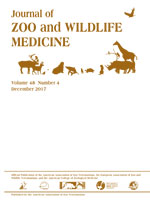A 21-yr-old intact male walrus (Odobendus rosmarus divergens) presented with acute onset of shifting lameness, initially associated with breeding behaviors. Further clinical signs manifested, including muscle tremors, anorexia, hematuria, and coughing. Diagnostics were limited, as the animal would not offer behaviors for voluntary sample collection. Signs were addressed with anti-inflammatories, anticonvulsants, and antibiotics. The walrus developed cluster seizures and ultimately, respiratory and cardiac arrest. Postmortem lesions included meningoencephalitis with intra- and extracellular protozoal zoites and schizonts, as well as interstitial pneumonia with intraendothelial protozoa. Immunolabeling of the protozoal organisms revealed Sarcocystis neurona. Previous S. neurona infections in an odobenid have not been reported. Protozoal infection should be considered in all species of captive marine mammals with nonspecific orthopedic, neurological, and respiratory clinical signs.
How to translate text using browser tools
1 December 2017
SARCOCYSTIS NEURONA–ASSOCIATED MENINGOENCEPHALITIS IN A PACIFIC WALRUS (ODOBENDUS ROSMARUS DIVERGENS)
Lana Krol,
Vanessa Fravel,
Diana G. Procter,
Kathleen M. Colegrove
ACCESS THE FULL ARTICLE
meningoencephalitis
Odobendus
protozoa
Sarcocystis
walrus





